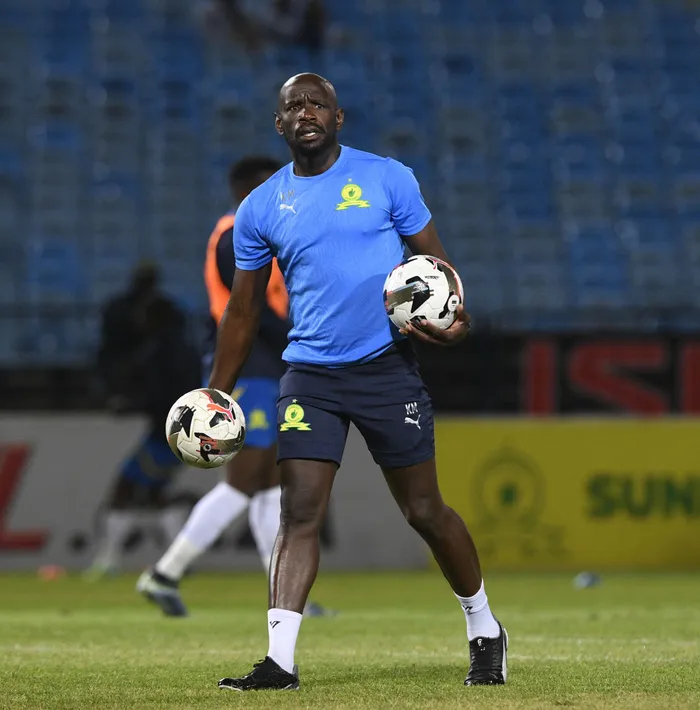
Zambian legend Kennedy Mweene continues to shine at Mamelodi Sundowns – and could help Chipolopolo spring a surprise against Bafana Bafana on Saturday. Photo: Backpagepix
Image: Backpagepix
Kennedy Mweene is carrying the torch for Zambian football in one of the continent’s biggest leagues – the PSL – at the moment.
As such, he could prove to be the difference between the two national teams – Chipolopolo and Bafana Bafana – when they meet in an international friendly at Nelson Mandela Bay Stadium in Gqeberha on Saturday (6pm kick-off).
Mweene is currently part of the Copper Bullets' technical team, which is led by interim coach Moses Sichone following the short spell of Avram Grant, serving as the goalkeeping coach.
This is, however, his secondary job. Mweene’s bread is buttered at PSL serial champions Mamelodi Sundowns, where he has transitioned into the goalkeeping coach role after hanging up his gloves, following an illustrious spell at the club and in the league.
His experience and knowledge of the game have been evident in his understudies. He is working with Bafana’s captain and Africa’s reigning No 1, Ronwen Williams, as well as former African great Denis Onyango at the club.
So, when Bafana and Chipolopolo meet in the Windy City this weekend, Mweene might just have some inside information on Williams and the team that could help his native country pull off a surprise victory on the day.
His compatriot and Jomo Cosmos legend Chris Katongo, has backed Mweene to hold onto the national team role on a full-time basis, given his success with both Chipolopolo and Sundowns.
“We are trying to fight for that,” said Katongo, referring to Mweene’s efforts to develop more Zambian goalkeepers and footballers.
“Kennedy has been fantastic. For me, I would support him to be the national team goalkeeping coach, especially for what he has done for Sundowns and the No 1 goalkeeper here in South Africa.
Given that the PSL is arguably one of the biggest leagues on the continent, its import of Zambian players in previous years helped Chipolopolo immensely.
So much so that when they won their maiden AFCON crown under coach Hervé Renard in 2012, their squad was made up largely of PSL-based players, including Mweene, Kampamba Chintu, Joseph Musonda, Davies Nkausu, Isaac Chansa, Noah Chivuta, Clifford Mulenga, and Collins Mbesuma.
But since then, the number of Zambian footballers who have graced the PSL has dropped significantly – and Katongo believes he knows why.
“It’s been a long time since we last made history here. If you look at the number of Zambian-born players who used to play in the PSL, it was fantastic,” Katongo said. “Of late, it has gone down.
“The reason it has gone down, is because the transition (from older to younger players) wasn’t good, especially on the national team side. We didn’t manage the transition well for the clubs either.”
The same cannot be said about South African football, though. In recent years, the PSL has consistently had at least three representatives in CAF inter-club competitions – including this season with Sundowns, Kaizer Chiefs and Stellenbosch. Forced to constantly inject new blood into their squads to build depth and stave off fatigue, South African clubs have unearthed exciting youngsters.
The participation of these domestic teams in continental football has also aided Bafana’s growth, as seen after qualifying for the 2026 Fifa World Cup in the US, Mexico and Canada.
Meanwhile, with Zambia only able to push for two teams in the group stage of continental football – Zesco United in the Confederation Cup and Power Dynamos in the Champions League – Katongo believes his nation needs to do more.
“When Zanaco, Nkana, Power, and Zesco were participating in these competitions regularly, it made a big difference. But if you look at the last five or six years, we’ve never gone beyond the next round,” he said.
“Those are the things that have held us back because not a lot of players are exposed to that level. But if you look at South African teams in the last eight years, they’ve been ever-present in the competition.
"They make sure that four teams participate. In my country, we only have two.”
Related Topics: